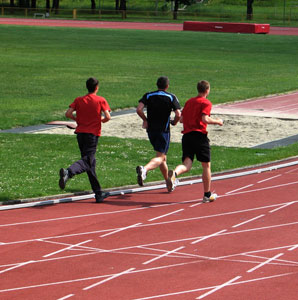 Following a healthy diet isn’t just important for weight loss. It also effects how you feel and your performance while working out. If you’re training for a marathon, or any other long-distance race, it’s important to fuel yourself with the right kinds of nutrients. Those who don’t eat enough while working out heavily risk feeling lightheaded or even fainting. To optimize your running, be sure to eat a balance of healthy carbs, protein, and fats (yes, even fats).
Following a healthy diet isn’t just important for weight loss. It also effects how you feel and your performance while working out. If you’re training for a marathon, or any other long-distance race, it’s important to fuel yourself with the right kinds of nutrients. Those who don’t eat enough while working out heavily risk feeling lightheaded or even fainting. To optimize your running, be sure to eat a balance of healthy carbs, protein, and fats (yes, even fats).
Carbs
You body needs carbs to be readily available to burn during exercise, and they should make up 45 percent to 65 percent of you daily diet. But beware! We don’t mean white bread and pasta. Most of your carbs should come from fruits, veggies, and dairy products like yogurt. Breads and cereals should be whole grain. Save high fiber foods for after your run, because your body will have a difficult time digesting them while you’re moving.
Protein
Protein is well-know for being key to muscle-building. Protein doesn’t play a huge role when you’re actually running, but it does help reduce muscle breakdown. Protein should make up about 10 percent to 35 percent of your daily diet. However, if you find yourself feeling hungry throughout the day, increasing the amount of lean protein can help you feel fuller. Chicken, fish, egg whites, lentils, edamame and low-fat dairy products are all good sources of protein.
Fats
Fats have long been targeted as the anti-diet food, but they are good for supporting the body when you’re planning on exercising for more than 90 minutes. Just be sure to avoid saturated fats. Healthy fats from plant sources should make up 25 to 35 percent of a runner’s diet. Skip the bacon, and think olive oil, walnuts, and avocados.
Hydration Tip: Don’t chug water on the starting block. Instead, get hydrated the day before your run.
Via FitSugar.
Also Read:
Protein vs. Carbs: Post-Workout Fuel
